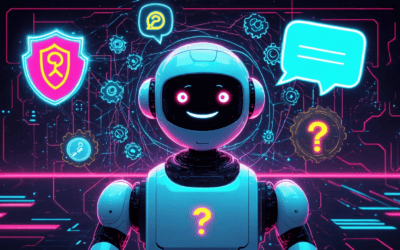In today’s fast-paced world, planning a trip can often feel overwhelming, but with the advent of a travel chatbot, the process has been revolutionized. This article delves into how a travel chat bot can streamline your trip planning experience, making it more efficient and enjoyable. We will explore the fundamentals of what a chatbot for travel is, highlighting its key features and capabilities. Additionally, we will discuss whether a chatbot can effectively plan your trip, comparing it to traditional trip planners. For those curious about budget-friendly options, we will investigate the availability of free travel chatbots and their benefits. Furthermore, we will guide you through the steps to create your own travel bot, along with the tools and platforms that can assist you in this endeavor. Finally, we will examine real-world applications of travel chatbots and their role alongside travel agents. Join us as we uncover the transformative potential of chatbot travel solutions and provide you with practical insights to enhance your travel planning journey.
What is a travel chatbot?
A travel chatbot is an AI-powered tool designed to assist travelers by providing instant support and information throughout their journey. These chatbots leverage natural language processing (NLP) and machine learning to engage with users in real-time, offering a range of services that enhance the travel experience. Here are key features and benefits of travel chatbots:
- Real-Time Updates: Travel chatbots deliver timely notifications regarding flight statuses, gate changes, and reservation modifications. This ensures travelers are always informed, reducing the risk of missing important updates.
- 24/7 Availability: Unlike traditional customer service, chatbots are available around the clock, allowing travelers to access assistance at any time, whether it’s day or night. This is particularly beneficial for international travelers across different time zones.
- Personalized Recommendations: By analyzing user preferences and past behaviors, travel chatbots can suggest tailored travel itineraries, accommodations, and activities, enhancing the overall travel experience.
- Booking Assistance: Many travel chatbots facilitate the booking process by guiding users through flight and hotel reservations, making it easier to plan trips without the need for human intervention.
- Cost-Effective Solution: Implementing chatbots can significantly reduce operational costs for travel companies by automating routine inquiries and support tasks, allowing human agents to focus on more complex issues.
- Feedback Collection: Travel chatbots can gather user feedback post-trip, providing valuable insights for companies to improve their services and customer satisfaction.
In summary, travel chatbots are revolutionizing the travel industry by providing efficient, personalized, and accessible support, ultimately enhancing the traveler’s experience and streamlining operations for travel providers.
Understanding the Basics of Travel Chatbots
Travel chatbots, often referred to as chatbots for travel, are designed to simplify the travel planning process. They utilize advanced algorithms to understand user queries and provide relevant responses. This technology not only improves user engagement but also enhances customer satisfaction by offering immediate assistance. The integration of travel chatbots into various platforms, such as websites and messaging apps, allows users to interact seamlessly, making travel planning more accessible than ever.
Key Features of Travel Chatbots
When exploring the capabilities of travel chatbots, several key features stand out:
- Integration with Travel Services: Travel chatbots can connect with various travel services, including airlines, hotels, and car rental companies, providing users with a comprehensive travel solution.
- Multilingual Support: Many travel chatbots offer multilingual capabilities, allowing them to assist users from different linguistic backgrounds, thus broadening their accessibility.
- Interactive User Experience: Through engaging interfaces and conversational AI, travel chatbots create an interactive experience that keeps users engaged and informed throughout their journey.
- Data Security: With the increasing concern over data privacy, travel chatbots are designed to ensure secure transactions and protect user information, fostering trust among travelers.
By leveraging these features, travel chatbots not only enhance the travel experience but also streamline operations for travel companies, making them an essential tool in the modern travel landscape.

Can a Chatbot Plan a Trip?
Yes, a chatbot can effectively plan a trip by utilizing advanced algorithms and data analysis to create personalized travel itineraries. Here’s how chatbots enhance the trip planning experience:
- Customized Itineraries: Chatbots can analyze user preferences, such as budget, interests, and travel style, to generate tailored travel plans. This personalization ensures that the itinerary aligns with the traveler’s desires, making the experience more enjoyable (Source: Travel + Leisure).
- Time-Saving: By automating the research process, chatbots can quickly provide options for flights, accommodations, and activities, significantly reducing the time spent on planning. This efficiency allows travelers to focus on enjoying their trip rather than getting bogged down by logistics (Source: Forbes).
- 24/7 Availability: Unlike traditional travel agents, chatbots are available around the clock, allowing users to plan their trips at their convenience. This accessibility ensures that travelers can get assistance whenever they need it, regardless of time zones (Source: Skyscanner).
- Real-Time Updates: Chatbots can provide real-time information regarding flight changes, weather conditions, and local events, helping travelers stay informed and adjust their plans accordingly. This feature enhances the overall travel experience by minimizing disruptions (Source: TechCrunch).
- Cost-Effectiveness: Many chatbots offer free or low-cost services compared to traditional travel agencies, making trip planning more accessible to a wider audience. This affordability can lead to better budget management for travelers (Source: Business Insider).
- User-Friendly Interfaces: Modern chatbots often feature intuitive interfaces that simplify the planning process. Users can interact through natural language, making it easy to ask questions and receive immediate responses (Source: HubSpot).
In conclusion, chatbots are revolutionizing the way we plan trips by providing customized, efficient, and user-friendly solutions. Their ability to deliver real-time updates and cost-effective options makes them an invaluable tool for travelers looking to enhance their travel planning experience.
How Travel Chatbots Enhance Trip Planning
Travel chatbots significantly improve the trip planning process by offering a range of features that cater to the needs of modern travelers. These travel chatbots utilize artificial intelligence to streamline the planning experience, ensuring that users receive relevant information quickly and efficiently.
One of the standout features of travel chatbots is their ability to provide personalized recommendations. By analyzing user data and preferences, these bots can suggest destinations, activities, and accommodations that align with individual interests. This level of customization enhances user satisfaction and encourages engagement with the chatbot.
Additionally, travel chatbots can integrate with various platforms, allowing users to book flights, hotels, and activities directly through the chat interface. This seamless integration not only saves time but also simplifies the entire booking process, making it more convenient for travelers.
Comparing Travel Chatbots with Traditional Trip Planners
When comparing travel chatbots with traditional trip planners, several key differences emerge. While traditional planners often require extensive back-and-forth communication, travel chatbots offer instant responses and solutions. This immediacy is particularly beneficial for users who prefer quick interactions.
Moreover, travel chatbots are available 24/7, providing assistance outside of regular business hours. This constant availability is a significant advantage over traditional travel agencies, which may have limited hours of operation. Users can plan their trips at any time, ensuring that they receive support whenever they need it.
Cost is another factor where travel chatbots excel. Many chatbots operate at a lower cost than traditional travel agencies, making them an attractive option for budget-conscious travelers. This affordability allows users to allocate more of their budget towards experiences rather than planning fees.
In summary, while traditional trip planners have their merits, travel chatbots offer a modern, efficient, and cost-effective alternative for trip planning. Their ability to provide personalized recommendations and instant support makes them an essential tool for today’s travelers.
Is there a free AI chatbot?
Yes, there are several free AI chatbots available that offer a range of functionalities. These travel chatbots can assist users in planning trips, answering queries, and providing personalized recommendations. Here are some notable options:
- Perplexity AI: This free AI chatbot is connected to the internet, allowing it to provide real-time information and sources. It features an intuitive user interface that enhances user experience. Perplexity AI is designed to assist users in finding answers quickly and efficiently.
- ChatGPT: OpenAI offers a free version of ChatGPT, which is widely recognized for its conversational abilities and versatility. Users can engage with the chatbot for various tasks, including answering questions, providing recommendations, and generating creative content.
- Cleverbot: This chatbot has been around for years and is known for its ability to engage in casual conversation. While it may not provide sourced information like Perplexity AI, it offers an entertaining chat experience.
- Replika: Aimed at providing companionship, Replika is a free AI chatbot that learns from user interactions. It can engage in meaningful conversations and help users explore their thoughts and feelings.
- Chatbot.com: This platform offers a free trial that allows users to create and interact with chatbots for various applications, including customer service and personal assistance.
These chatbots leverage advanced AI technologies to enhance user interaction and provide valuable information. For more detailed insights on AI chatbots, you can refer to articles from reputable sources such as ZDNet and TechCrunch, which regularly review and analyze the latest developments in AI technology.
Benefits of Using Free Travel Chatbots
Utilizing free travel chatbots offers numerous advantages for users looking to enhance their travel planning experience. Here are some key benefits:
- Cost-Effective Solutions: Free travel chatbots provide valuable assistance without any financial commitment, making them accessible to a wide range of users.
- 24/7 Availability: These chatbots are available around the clock, allowing users to get assistance at any time, regardless of time zones or business hours.
- Instant Responses: Travel chatbots can provide immediate answers to user inquiries, streamlining the planning process and reducing wait times.
- Personalized Recommendations: Many travel chatbots use AI algorithms to analyze user preferences and offer tailored suggestions, enhancing the overall travel experience.
- Integration with Other Services: Free travel chatbots often integrate with various travel services, such as booking platforms and local attractions, providing a comprehensive travel planning tool.
By leveraging these benefits, users can make informed decisions and enjoy a smoother travel planning process with the help of travel chatbots.
How to Create a Travel Chatbot?
Creating a travel chatbot involves several strategic steps to ensure it meets user needs and enhances the travel experience. By following a structured approach, you can develop a chatbot that effectively assists users in planning their trips and provides valuable information.
Steps to Develop Your Own Travel Chatbot
To create a successful travel chatbot, start by defining its purpose and features. Identify the primary functions your chatbot will serve, such as booking assistance, travel recommendations, or customer support. Consider incorporating features like natural language processing (NLP), multilingual support, and personalized travel itineraries to enhance user experience. This foundational step will guide the development process and ensure your chatbot aligns with user expectations.
Next, select the type of travel chatbot that best suits your needs. You can choose between a rule-based chatbot, which follows predefined scripts, or an AI-driven chatbot that utilizes machine learning for more dynamic interactions. Evaluating your target audience will help determine which type aligns best with user expectations and needs.
Once you have a clear vision, determine the necessary integrations for your travel chatbot. Specify integrations with travel APIs, such as Skyscanner or Expedia, for real-time data on flights, hotels, and car rentals. Additionally, include payment gateways for seamless transaction processing and customer relationship management (CRM) systems for personalized service.
Tools and Platforms for Building Travel Chatbots
Choosing the right development platform is crucial for your travel chatbot’s success. Assess platforms like Dialogflow, Microsoft Bot Framework, or Chatfuel based on your technical expertise and desired features. Consider scalability and ease of use, ensuring the platform can accommodate future growth and additional functionalities.
After selecting a platform, develop a minimum viable product (MVP) that includes essential features to gather user feedback. Focus on core functionalities that address the most common travel inquiries and issues. This iterative process allows you to refine and enhance the chatbot’s capabilities based on user interactions.
Finally, use feedback from users to iterate and enhance your chatbot’s features. Incorporate advanced functionalities like voice recognition or sentiment analysis to improve user engagement. Regularly update the chatbot with new travel trends, seasonal offers, and user preferences to maintain relevance and engagement.
For further insights into chatbot development methodologies, consider resources like Brain Pod AI’s Help Center and articles discussing the impact of chatbots on travel services, such as those found on the Skyscanner Blog.

What Does a Chatbot Actually Do?
A travel chatbot is an advanced conversational AI system designed to simulate human interaction through text or voice, specifically tailored for the travel industry. It operates by utilizing natural language processing (NLP) and machine learning algorithms to understand user queries and provide relevant responses. Here’s a breakdown of how chatbots function and their applications in travel:
Functions and Capabilities of Travel Chatbots
Travel chatbots serve a variety of functions that enhance the travel experience for users. They are designed to:
- Understand User Intent: Travel chatbots analyze user input to determine the intent behind the message. This involves breaking down the language using NLP techniques, which help the bot comprehend context, sentiment, and specific keywords.
- Response Generation: Once the intent is identified, chatbots generate responses based on pre-defined rules or learned patterns. This can include:
- Rule-Based Responses: Simple bots follow a set of programmed rules to respond to specific queries.
- AI-Powered Responses: More sophisticated chatbots use machine learning to learn from interactions and improve their responses over time.
- Integration with Systems: Travel chatbots can be integrated with various platforms such as websites, messaging apps, and customer service systems, allowing them to pull information from databases or APIs to provide accurate answers.
Real-World Applications of Chatbots for Travel
Travel chatbots have numerous applications that significantly enhance user experience:
- Customer Support: Travel chatbots handle common inquiries, reducing the workload on human agents and providing 24/7 assistance. They can answer questions about flight statuses, hotel bookings, and travel regulations.
- E-commerce: They assist users in finding travel packages, processing bookings, and answering questions about services, making the travel planning process seamless.
- Personal Assistants: Virtual assistants in travel apps help users manage itineraries, access travel information, and receive personalized recommendations.
By leveraging the capabilities of travel chatbots, businesses can improve efficiency, reduce operational costs, and enhance user engagement. For more insights on how chatbots are transforming customer service, check out our article on revolutionizing customer support.
Are travel agents free to talk to?
Travel agents can be free to talk to, but their services may come with various fees depending on the agent and the services provided. Here are key points to consider:
- Service Fees: Many travel agents charge service fees that can range from $50 to $500. These fees may cover consultation, itinerary planning, and other personalized services.
- Commission-Based Model: Some travel agents do not charge clients directly. Instead, they earn commissions from airlines, hotels, and other travel suppliers for bookings made on behalf of their clients. This means that in many cases, clients can access travel agent services at no upfront cost.
- Flat-Rate Fees: Certain travel agents may offer flat-rate trip planning services, which can be beneficial for complex itineraries or group travel. This fee structure provides transparency and allows clients to understand the total cost upfront.
- Value of Expertise: While some travelers may hesitate to use a travel agent due to potential costs, the expertise and insider knowledge that agents provide can lead to significant savings and enhanced travel experiences. Agents often have access to exclusive deals and can navigate complex travel arrangements more efficiently.
- Considerations for Choosing a Travel Agent: When selecting a travel agent, consider their specialization (e.g., luxury travel, adventure travel), reputation, and client reviews. It’s also important to discuss fee structures upfront to avoid any surprises.
For more detailed insights on the value of travel agents and their fee structures, you can refer to resources such as the American Society of Travel Advisors (ASTA) and travel industry publications like Travel Weekly.
The Role of Travel Agents in the Age of Chatbots
In the evolving landscape of travel planning, the role of travel agents is being reshaped by the rise of travel chatbots. While chatbots like Messenger Bot offer automated assistance for booking and inquiries, travel agents provide a personal touch that technology cannot replicate. Travel agents excel in offering tailored advice, understanding client preferences, and managing complex travel arrangements that may require human intervention.
Moreover, travel agents can complement chatbot services by handling unique requests or resolving issues that arise during travel. This synergy allows travelers to benefit from the efficiency of chatbots while still having access to expert guidance when needed. As the travel industry continues to embrace technology, the collaboration between travel agents and chatbots will likely enhance the overall travel experience.
When to Consult a Travel Agent vs. Using a Travel Chatbot
Deciding whether to consult a travel agent or use a travel chatbot depends on several factors, including the complexity of the trip, personal preferences, and budget. Here are some scenarios to consider:
- Complex Itineraries: If your travel plans involve multiple destinations, special accommodations, or unique experiences, consulting a travel agent may be beneficial. Their expertise can help navigate intricate arrangements that a chatbot may not handle effectively.
- Personalized Service: For travelers who value personalized service and tailored recommendations, a travel agent can provide insights based on their knowledge and experience. This is particularly useful for luxury or adventure travel.
- Budget Constraints: If you’re looking for budget-friendly options and straightforward bookings, a travel chatbot can efficiently handle these tasks without incurring additional fees. Chatbots can quickly compare prices and provide instant responses.
- Last-Minute Changes: In cases where travel plans change unexpectedly, a travel agent can offer immediate assistance and alternatives, while chatbots may have limitations in handling urgent requests.
Ultimately, the choice between a travel agent and a travel chatbot should align with your travel needs and preferences. For more information on how chatbots are revolutionizing the travel industry, check out our article on best AI chatbots.
Travel Chatbot Examples
Travel chatbots have become essential tools for enhancing user experience in the travel industry. They provide immediate assistance, streamline booking processes, and offer personalized recommendations. Below are some notable examples of travel chatbots that exemplify the capabilities and advantages of this technology.
Best Travel Chatbots Available Today
Among the leading travel chatbots, Brain Pod AI stands out for its advanced AI capabilities, allowing users to engage in natural conversations while receiving tailored travel advice. Other notable mentions include:
- Expedia Chatbot: This chatbot assists users in booking flights, hotels, and rental cars, providing a seamless travel planning experience.
- Kayak Chatbot: Kayak’s chatbot helps users compare prices and find the best travel deals, making it a valuable tool for budget-conscious travelers.
- Travelmate: This AI-powered chatbot offers personalized travel itineraries and suggestions based on user preferences, enhancing the overall travel experience.
These travel chatbots not only improve efficiency but also enhance customer satisfaction by providing quick and accurate responses to inquiries.
Innovative Travel Chatbot Apps to Consider
In addition to the established chatbots, several innovative travel chatbot apps are making waves in the industry. These apps leverage cutting-edge technology to offer unique features:
- Hopper: This app predicts flight prices and alerts users when to book, helping travelers save money.
- Skyscanner: Skyscanner’s chatbot allows users to search for flights and hotels through messaging platforms, making travel planning more accessible.
- TripBot: This chatbot provides real-time travel updates and recommendations, ensuring travelers stay informed throughout their journey.
These innovative travel chatbots exemplify how technology can transform the travel experience, making it more efficient and enjoyable for users. For more insights on how chatbots are revolutionizing customer service, check out our article on the best AI chatbots.




